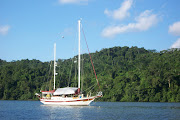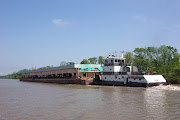 Cities, towns, counties and communities all along the Eastern Seaboard are getting on the anti- anchoring bandwagon. The reasoning for these restriction fall into several categories. First is pollution, citing sewage discharge, contaminates from bilge water, leaking fuel tanks and spills, careless disposal of trash ashore and the associated problems of abandoned vessels. Next comes damage to the seabeds and surrounding shorelines. These generally are from anchors and rode scouring the bottom, damaging seagrass and vessels breaking loose from their anchors and damaging other boats, docks, etc. A biggy is the nuisance factor and here is where pressure from landowners play a large part. Generators running on deck at night, loud music and parties, intoxication, trespassers trying to gain access to shore facilities and crime to name a few. There is also the navigational hazard from boats with no anchor lights, anchored or dragging into channels and blocking access to docks and facilities. I doubt that even the staunchest opponents to anchoring restrictions can argue these points.
Cities, towns, counties and communities all along the Eastern Seaboard are getting on the anti- anchoring bandwagon. The reasoning for these restriction fall into several categories. First is pollution, citing sewage discharge, contaminates from bilge water, leaking fuel tanks and spills, careless disposal of trash ashore and the associated problems of abandoned vessels. Next comes damage to the seabeds and surrounding shorelines. These generally are from anchors and rode scouring the bottom, damaging seagrass and vessels breaking loose from their anchors and damaging other boats, docks, etc. A biggy is the nuisance factor and here is where pressure from landowners play a large part. Generators running on deck at night, loud music and parties, intoxication, trespassers trying to gain access to shore facilities and crime to name a few. There is also the navigational hazard from boats with no anchor lights, anchored or dragging into channels and blocking access to docks and facilities. I doubt that even the staunchest opponents to anchoring restrictions can argue these points. Florida has become the most restrictive and regulated state in the US for anchoring of vessels in their waters. Many towns and municipalities are attempting to pass regulations to restrict or prohibit anchoring and we the boating public will have little to say. The amazing thing here is that Florida already has a state wide anchoring regulation signed by then Governor, Jeb Bush on July 1, 2006. These regulations essentially say that other than in a mooring field, municipalities have no authority to regulate where a typical cruising vessel anchors, unless they can prove the vessel is not used for anything other than a residence or place of business. Here the wording get tricky. If you are a live-aboard you can be regulated. Here is how the terms are defined under the Florida law,
Florida has become the most restrictive and regulated state in the US for anchoring of vessels in their waters. Many towns and municipalities are attempting to pass regulations to restrict or prohibit anchoring and we the boating public will have little to say. The amazing thing here is that Florida already has a state wide anchoring regulation signed by then Governor, Jeb Bush on July 1, 2006. These regulations essentially say that other than in a mooring field, municipalities have no authority to regulate where a typical cruising vessel anchors, unless they can prove the vessel is not used for anything other than a residence or place of business. Here the wording get tricky. If you are a live-aboard you can be regulated. Here is how the terms are defined under the Florida law,(a) Any vessel used solely as a residence; OR
(b) Any vessel represented as a place of business, a professional or other commercial
enterprise, or a legal residence.
A commercial fishing boat is expressly excluded from the term "live-aboard vessel”.
 If you consider your self a "full time cruiser" you can not be regulated under the law. However, many municipalities have chosen to ignore the state regulations. In two well known cases, one in Marco Island, which went to court and the city lost, and the other in Stuart, Florida, where it did not make it to court but the city issued a public apology, a small monetary consideration and withdrawal of their regulations, the cities were clearly in violation of State laws. Yet the regulations put forth by the City of Sarasota clearly show that the law is being ignored. If allowed to continue unchecked, this will certainly spread to other states and soon we will have no place to practice free navigation. Much of the pressure to pass these regulations comes from wealthy landowners with deep pockets and political connections.
If you consider your self a "full time cruiser" you can not be regulated under the law. However, many municipalities have chosen to ignore the state regulations. In two well known cases, one in Marco Island, which went to court and the city lost, and the other in Stuart, Florida, where it did not make it to court but the city issued a public apology, a small monetary consideration and withdrawal of their regulations, the cities were clearly in violation of State laws. Yet the regulations put forth by the City of Sarasota clearly show that the law is being ignored. If allowed to continue unchecked, this will certainly spread to other states and soon we will have no place to practice free navigation. Much of the pressure to pass these regulations comes from wealthy landowners with deep pockets and political connections.But the problems of derelict boats and unruly live-aboards need not be dealt with using heavy handed regulations. Navigating our waterways falls under the control of the United States Government, i.e. the US Coast Guard, Corps of Engineers, National Parks, NOAA, etc. Next comes the State and then finally the local entities. There already exist a myriad of federal and state regulations for boats that cover, safety, seaworthiness, sewage and waste disposal and more. If these existing regulations are applied to those problem boats, they would soon go away and there would be no need for additional regulations. But that would remove the financial incentives from the equation.
 The city of Key Biscayne had such issues in Hurricane Harbor. The city discussed at length the need to regulate these boats out of that harbor. Many homeowners also were boat owners and quickly realized they would also regulate themselves out. Cooler heads prevailed and the city took the "use the current regulations" approach. Soon all of the anchored boats were inspected for safety and sewage disposal compliance and were cited to either fix the problems or face fines. They all packed up, left and never came back. It may be a simplistic approach but it has and does work. The state of Florida is giving us all the impression that if you don't have a mega-yacht and tie up to a marina that you are not wanted. But that is not in all places in that state. There are still many unregulated areas that boaters are welcome. But they are becoming fewer and farther between. The state is in fact studying new regulations to again be implemented state wide to attempt to standardize regulations. But that was what I understood that last regulations were intended to do.
The city of Key Biscayne had such issues in Hurricane Harbor. The city discussed at length the need to regulate these boats out of that harbor. Many homeowners also were boat owners and quickly realized they would also regulate themselves out. Cooler heads prevailed and the city took the "use the current regulations" approach. Soon all of the anchored boats were inspected for safety and sewage disposal compliance and were cited to either fix the problems or face fines. They all packed up, left and never came back. It may be a simplistic approach but it has and does work. The state of Florida is giving us all the impression that if you don't have a mega-yacht and tie up to a marina that you are not wanted. But that is not in all places in that state. There are still many unregulated areas that boaters are welcome. But they are becoming fewer and farther between. The state is in fact studying new regulations to again be implemented state wide to attempt to standardize regulations. But that was what I understood that last regulations were intended to do.Be it Florida or Rhode Island the boating landscape is changing. If you would prefer to not have it regulate you out of your favorite pass time I would urge you to get involved as best you can and help keep the process fair and open. We should all be weary of too much government and urge our waterfront communities to try existing regulations before enacting more. As boaters we should all be part of the process, lest the process overrun us all.





No comments:
Post a Comment
Note: Only a member of this blog may post a comment.